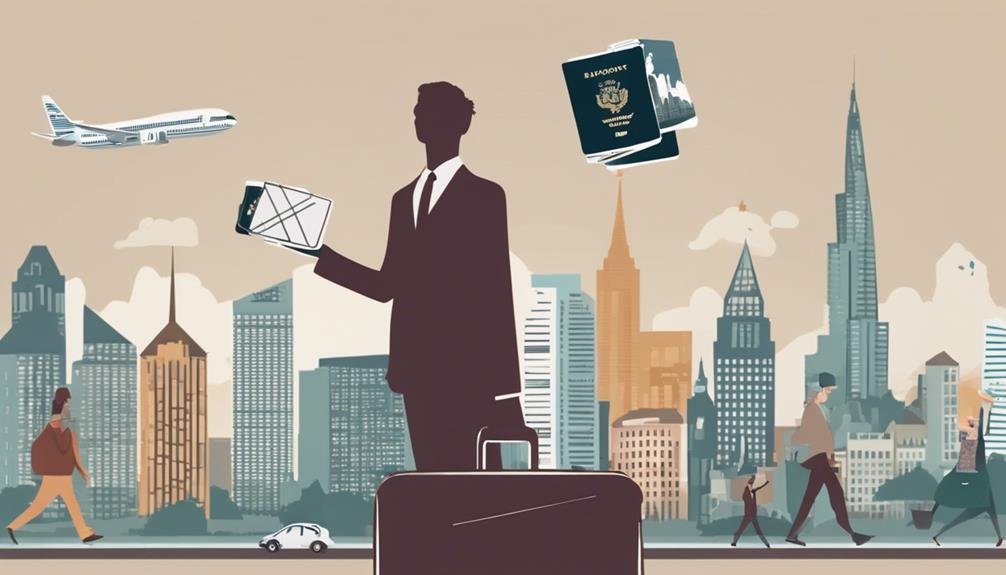When living abroad, juggling work responsibilities and personal life can become a delicate balancing act. The clash of work cultures, societal norms, and the absence of a familiar support network can present unexpected challenges. You may find yourself torn between adapting to the demands of a new job and embracing the opportunities for personal growth in a foreign land. Stay tuned to uncover strategies that can help you navigate these complexities and find harmony amidst the chaos of expat life.
Key Takeaways
- Cultural differences in work expectations impact work-life balance abroad.
- Lack of a familiar support system can complicate balancing work and personal life.
- The temptation to constantly explore new surroundings can disrupt the work-life balance.
- Navigating social norms and etiquette in a foreign country adds to the challenge.
- Expatriates often work longer hours abroad, affecting their time.
Cultural Adjustment and Work Expectations
Adapting to new work norms and understanding local expectations is essential for expatriates maneuvering cultural adjustment abroad. Work expectations vary considerably across cultures, impacting the balance between work and personal life. In some countries, there’s a strong emphasis on long working hours and dedication to the job, often at the expense of personal time. On the contrary, other cultures prioritize work-life balance, encouraging employees to leave work on time and enjoy personal pursuits.
Expatriates may be caught between these contrasting work philosophies, leading to stress and difficulty harmoniously integrating work and personal life. Misunderstandings regarding work hours, communication styles, and task priorities can further complicate the situation, making it challenging for expatriates to navigate the new work dynamics effectively.
To successfully balance work and personal life abroad, expatriates must remain open-minded, adaptable, and willing to learn about the cultural nuances influencing work expectations. By aligning their work habits with the host country’s work culture, expatriates can mitigate potential conflicts and enhance their cultural adjustment experience.
Strain From Navigating Social Norms
How do cultural differences in social norms contribute to expatriates’ strain when managing interactions and relationships abroad?
Moving to a new country means encountering unfamiliar social norms that can challenge your understanding of acceptable behaviors. Cultural differences in social etiquette, communication styles, and personal boundaries can lead to misunderstandings and discomfort in social interactions.
Adapting to the host country’s customs may require learning new ways of maneuvering social situations, which can be intimidating for expatriates. Fitting in and feeling accepted within local social circles becomes a significant concern when social norms in the new environment differ greatly from what you’re accustomed to.
The struggle to align your behavior with the host culture’s expectations while maintaining your identity can strain your social experiences abroad. Successfully managing these challenges involves a willingness to learn, adapt, and respect the cultural nuances that shape social interactions in your new environment.
Lack of Familiar Support System

Living abroad as an expatriate often means lacking the familiar support system of family and close friends, which can result in feelings of loneliness and isolation. Without the emotional and practical support they’re accustomed to, expats may find it challenging to navigate the various hurdles of daily life in a foreign land.
The absence of a reliable support network can intensify the difficulties of effectively balancing work and personal life. Coping with the emotional strain of being away from loved ones while managing the demands of a new environment can be overwhelming. Expats often face the challenge of building new relationships to fill the void left by their distant support system.
Establishing a new support network takes time and effort, adding complexity to an already intricate process of adapting to life abroad. In this situation, finding ways to connect with others and cultivate meaningful relationships becomes vital for combating feelings of isolation and fostering a sense of belonging in a foreign country.
Temptation to Constantly Explore
Exploring the alluring distractions of a new country and its culture can pose a challenge for expatriates working to maintain a balance between work responsibilities and the temptation to explore constantly.
The excitement of discovering new places and activities in your new setting may lead to prioritizing leisure over work commitments, potentially affecting productivity. To address this dilemma, consider setting boundaries and allocating specific time slots for personal activities while ensuring that work obligations are met.
Embracing flexibility is key to enjoying your exploration while staying focused on your professional duties. By consciously balancing work demands with the urge to immerse yourself in the host country’s offerings, you can aim for a better work-life balance.
Remember that maintaining relationships at work and in your personal life is essential for overall well-being. Manage your time effectively to maximize your experiences abroad.
Establishing Healthy Work-Life Balance

Establishing a healthy work-life balance while living abroad requires conscious effort and effective time management to navigate the challenges of international assignments. Expatriates often find themselves working longer hours, an average of 13.4 hours more per week compared to their home countries. The demands of adjusting to a new job, increased responsibilities, and project implementation can tip the scales, making it difficult to balance work and personal life.
Compensation structures that incentivize completing assignments may further extend working hours for expatriates. Factors like language barriers, cultural differences, and the absence of familiar support networks can also disrupt family and social life, adding to the complexity of achieving work-life balance abroad.
Expatriates must manage their time proactively, set boundaries, and prioritize activities to ensure a harmonious blend of their personal and professional lives while living and working in a foreign country.
Conclusion
Managing work and personal life abroad is difficult due to cultural adjustment and varying work expectations. Adapting to unfamiliar social norms and lacking a familiar support system can add strain.
The temptation to constantly explore can hinder your ability to establish a healthy work-life balance. By understanding these challenges and actively seeking a balance, you can navigate the complexities of expat life more effectively.
FAQs
1. Why Is It So Hard to Balance Work and Life?
Balancing work and personal life can be tough due to various factors. Time management, cultural differences, and burnout risk all play a role.
Social isolation, language barriers, and financial pressures add complexity. Prioritizing tasks becomes essential, while lack of support compounds challenges.
Finding a healthy balance is key to navigating this. It requires understanding these elements and actively working towards equilibrium daily.
2. Why Is Work-Life Balance Challenging?
Balancing work and personal life abroad challenges you due to time management, work demands, stress levels, and family obligations. Cultural differences, individual priorities, social expectations, and language barriers complicate the balance. Finding harmony amidst these factors can be demanding.
Juggling work commitments while nurturing personal relationships and addressing family needs in a foreign environment requires adaptability, effective communication, and intentional effort.
3. How Do People Struggle With Work-Life Balance?
Balancing work and personal life can be a juggling act. You must grapple with time management, maneuver through cultural differences, and overcome language barriers. Social expectations and career pressures further complicate the mix.
Your priorities collide with mental health concerns, and communication challenges add another layer of complexity. It’s like trying to solve a puzzle with missing pieces while walking a tightrope.
4. What Are Some of the Issues Relating to Achieving Work-Life Balance?
Balancing work and personal life abroad presents various challenges. Time management becomes essential as you navigate longer working hours and new job responsibilities due to international assignments.
Cultural differences and communication problems can strain relationships, while career expectations and limited flexibility may lead to burnout.
Finding social support and practicing self-care is vital for maintaining a healthy work-life balance in a foreign environment.

